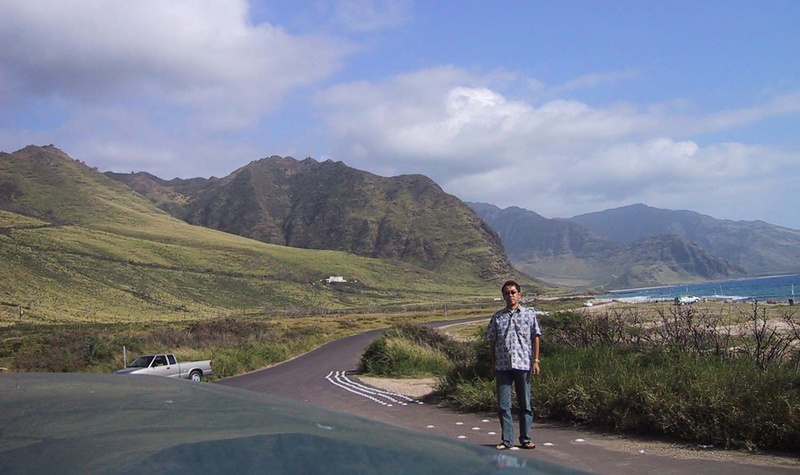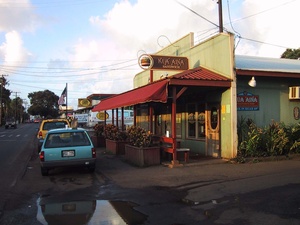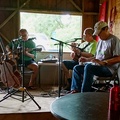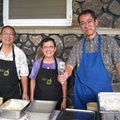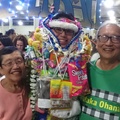So, I would like to introduce some of the English expressions that L corrected, interspersed with anecdotes. It's not interesting to talk about the correction of simple mistakes or grammatical errors, and although I may be a little biased, I think I have pretty much mastered the basics of grammar and don't make many mistakes. So, I would like to focus on the ones that I learned for the first time after they were corrected, or the ones that surprised me when I discovered their meanings. These are things that you probably wouldn't have learned in school English. Although I'm not sure about my memory.
meet and see
I lived in Hawaii from 2001 to 2002. I returned to Japan in March 2002 and immediately went to Hawaii to attend my elementary school graduation ceremony in June. I met up with friends I hadn't seen in two months and hugged them while saying, "Nice meeting you (again)!" (Those who are good at English conversation will already notice how strange this is.) At that moment, I felt like my friends had distanced themselves from me. They were members of M-san and L-san's band and friends who often came to our garage parties. L-san, who was smiling and happy to see us again, immediately asked me in Japanese, "What? Is this the first time?" My friends also wondered for a moment if that was the first time we had met. Why was that?
"Meet" is used as a greeting when meeting someone for the first time, and from the second meeting onwards, "Nice seeing you" or "Nice to see you" should be used. However, I have no memory of ever learning this in school English. What a thing to say. Isn't this the very first greeting that fosters human relationships? I have already made the same mistake repeatedly in many places. It may be common knowledge for Japanese people who have learned English conversation in addition to school English, but I have never had this experience. Every time I met a dear friend or acquaintance, I would say "Nice to meet you," which would make them think, "Huh? Is this the first time?"
May and can
In school English, we were taught that "May I ~?" is British English and "Can I ~?" is American English, and we completely believed it. We use this phrase a lot in Hawaii as well. Fieldwork is a kind of "begging," so I wonder how many times a day we use it. Sometimes we say "May I ~?" more politely, and other times we say "Can I ~?" more casually, but when I asked L what the difference was, this was quite recently, around 2014. I received an explanation I never expected.
"Well, it's definitely different. It's the speaker's intention. When you use "May I ...?" you're not expecting a "No" response. It's used when you're asking a question expecting only a "Yes." The person being asked "May I ...?" also understands that. With "Can I ...?" the response could be either "Yes" or "No." This is also not taught in school English.
I have been doing fieldwork without knowing this. If I had used "May" more, I might have been able to convey my intentions more clearly to the other person and enter the field more smoothly. Also, if I had used a question like "May I ~?" instead of a subjective expression of intention like "I want to ~" or a softer "I'd like to ~", I might have been able to feel more comfortable in the field a little sooner by clearly conveying my intentions while leaving it to the other person to decide.
After going to Hawaii for over 20 years, I feel that my daily conversation skills have improved little by little. At the same time, I have become more aware of my English accent. I started learning English in junior high school, so there is nothing I can do about the Japanese accent of words. There seems to be a "10-11 year old wall" that determines whether you can acquire native pronunciation, and in the research for my first master's thesis, children who went to the United States or the United Kingdom after the fifth grade of elementary school all had a hard time with English. So it's inevitable that I have an accent in my pronunciation.
Before I knew it, I had stopped raising the pitch at the end of questions and was comfortable omitting the third person singular S. I don't say "He do" or "She don't" like M-san, or use double negatives to emphasize negation, but when I work in the mainland, I am sometimes asked, "Are you from Hawaii?" or "You must have lived somewhere outside the mainland?" For some reason, L-san has not corrected my intonation or the third person singular S.
There is a very old restaurant right next to the elementary school I go to. The glass exterior has become frosted over time, making it difficult to see inside, so Japanese tourists rarely come in. One day, M, L and I were having lunch at the restaurant. M's childhood friend came into the restaurant. M stopped talking to the other three in English and started speaking to him in pidgin English. L said, "Now, look. M switched to pidgin, didn't he? Do you understand?" I knew they had switched to a different language, but I couldn't understand the pidgin English they were speaking at all. Even now, I still can't understand pidgin English at all.
To enter the Japanese community in Hawaii, it is essential to be able to speak English. This may seem obvious, but I feel that the ability to express oneself is especially important. When introducing me to others, without exception, they say "He speaks English" rather than "He understands English." This shows that it is important to show a willingness to communicate.
I met M in 2001 and he seemed grumpy until around 2005. He was very kind but blunt. But by 2006, he started laughing a lot. We mostly went out together, but M and I started going out to eat and hang out more. We drank beer in the garage and he taught me everything from Hawaiian life and music to how to see and think about things and how to make decisions, through his detailed explanations.
Why did M-san start laughing? Thinking back, I suddenly started to be able to hear M-san's Hawaiian accent at that time. This must have conveyed to M-san that I was listening and understanding, and M-san was able to talk to me with confidence. M-san was actually a person who laughed a lot.
Mr. M, a third-generation Japanese-American, laments that fourth-generation Japanese-Americans are quiet and it is hard to tell what they are thinking. Japanese-Americans share the same roots as us Japanese people, but they do not have the idea of being able to understand each other without speaking, as in the word "telepathy." Japanese-American society in Hawaii is communicative, that is, it is a society rich in communication. Come to think of it, someone is always talking at garage parties.
© 2017 Seiji Kawasaki


